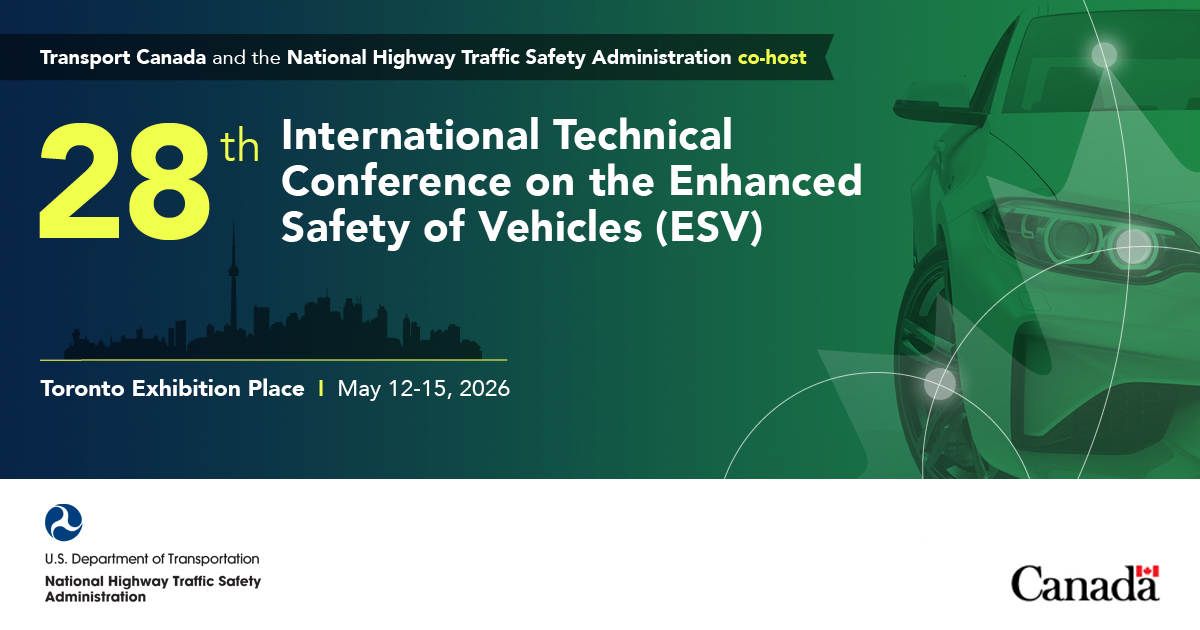
About
28th ESV, Exhibition Place Toronto, May 12-15, 2026
The 28th International Technical Conference on the Enhanced Safety of Vehicles will take place May 12-15, 2026, at Exhibition Place in Toronto, Canada.
This event, co-hosted by the U.S. Department of Transportation’s National Highway Traffic Safety Administration and Transport Canada, brings together global leaders, experts and innovators to advance motor vehicle safety.
Save the date and stay tuned for more updates!
The 28th ESV Conference will take place at Exhibition Place Toronto from May 12-15, 2026.
A Brief History of the Conference
The U.S. Department of Transportation’s National Highway Traffic Safety Administration is the government agency that implements the International Technical Conference on the Enhanced Safety of Vehicles, commonly referred to as ESV. This conference convenes biennially, with representatives from participating international governments within the transportation sector determining the venue.
Each conference is hosted by an ESV member country, and location selection typically alternates between North America, Europe and Asia. ESV attendees include members of governments; motor vehicle manufacturers; motor vehicle equipment suppliers; global safety researchers; motor vehicle safety, medical, insurance, legal and policy professionals; consumers; academia; students; and international media.
Origins
The ESV program originated in 1970 under the North Atlantic Treaty Organization Committee on the Challenges of Modern Society and was implemented through bilateral agreements between the United States, France, Germany, Italy, the United Kingdom, Japan and Sweden. The participating nations had agreed to develop experimental safety vehicles to advance state-of-the-art technology in automotive engineering and to meet periodically to exchange information on their progress. Since its inception, the number of international partners has grown to include the governments of Canada, Australia, the Netherlands, Hungary, Poland, the Republic of Korea and the European Commission.
Evolution
In 1971, the conference was named the International Technical Conference on Experimental Safety Vehicles. Over time, the focus of the conference shifted from the development of experimental safety vehicles to addressing broader issues in roadway safety and stronger international cooperation in reducing motor vehicle fatalities and injuries. These issues include program advances in areas such as advanced driver assistance systems, automated driving systems, crash safety, biomechanics and safety data evaluation.
In 1991, the participating governments agreed to change the name of the conference to, the International Technical Conference on the Enhanced Safety of Vehicles to reflect the broader focus. The 14th ESV conference, held in Munich, Germany, in 1994, was the first conference in which the new name was used.
The 25th ESV conference was held for the first time in Detroit, Michigan – “Motor City” itself. This event brought together many key stakeholders in vehicle safety to share knowledge, listen, engage, connect and collaborate with global counterparts. It brought together a wide range of panelists, speakers, authors and exhibitors. Attendees had the opportunity to participate in ride and drive demonstrations at Wayne State University. Over 30 technical exhibitors also provided attendees a firsthand experience of current and future safety innovations.
The most recent ESV conference – the 27th – held in Yokohama, Japan, April 3-6, 2023, marked the 50th anniversary of the conference and celebrated the unique opportunity to exchange ideas and strengthen global collaboration to improve vehicle safety technologies and standards. Growth of the automotive industry worldwide has brought new partners in pursuit of enhancing global vehicle safety.
Future
With a history spanning over 50 years, ESV remains dedicated to staying at the forefront of technical innovation, continuously seeking new avenues to advance safety. A cornerstone of the ESV program is its technical agenda, featuring author presentations that consistently push the boundaries of vehicle safety exploration, particularly in the realm of vehicle safety technology. As ESV approaches its sixth decade, organizers continue to strive to present participants with the latest achievements in the field of motor vehicle safety.
Transport Canada will host the 28th ESV conference in Toronto, May 12-15, 2026. Work is underway right now to make the next ESV another informative and inspiring vehicle safety experience for all attendees.
Call for Abstracts

Call for Abstracts Now Open!
View the technical sessions and submit your abstract here!
Call for Peer Review Abstracts
- January 14, 2025 - Call for abstract announced
- March 14, 2025 - Website live for abstract submission
- April 25, 2025 - Deadline for peer review abstract submission
- May 21-26, 2025 - Notification of peer review abstract status (first acceptance) authors receive guidelines and submission link for draft paper
Call for Traditional Abstracts
- March 14, 2025 - Call for abstracts opens
- June 13, 2025 - Deadline for traditional abstract submission
- July 29-August 1, 2025 - Notification on traditional abstract status sent to all authors
What’s the difference between Peer Review and Traditional Abstracts?
Peer review abstracts undergo a more rigorous review and editing process and may be published in a special issue of a scientific journal, which will feature approximately 15 papers from the 28th ESV Conference. It takes longer to complete the peer review process, requiring the earlier timeline. The submission deadline for peer review abstracts is April 25, 2025, and traditional abstracts deadline is June 13, 2025. Abstracts/papers submitted to the peer review process, but not selected to be published in the scientific journal will be returned to the Traditional abstract/paper submission process.
Traditional abstracts/papers undergo a lesser degree of review and if accepted are presented at the conference and published in the conference proceedings.
Student Competition

Be Part of the Growing Excitement!
Join Us!
- A contest for students as part of the Enhanced Safety of Vehicles Conference May 12-15, 2026, in Toronto, Canada.
- Teams of students and faculty develop models or mockups of new safety systems.
- Top 9 teams present at ESV in Toronto.
Important Dates
- 8/15/25: Abstract due
- 8/19/25: Abstract acceptance notification sent
- 1/21/26-1/23/26: Regional design evaluation
- 2/6/26: International finalists notified
- 5/12/26: Oral presentation by international finalists in Toronto
- 5/15/26: 1st place winner and runner-up recognition at the closing ceremony
Learn more about why — and how — you should enter the student competition!
Contact
For more information, contact NHTSA at: esv@dot.gov
For more information, contact Transport Canada at:
TC.EnhancedSafetyVehicles-SecuriteAccrueDesVehicules.TC@tc.gc.ca
Government Focal Point Members by Country
Archive
Past ESV Proceedings
- 27th ESV Proceedings - Yokohama, Japan, April 3-6, 2023
- 26th ESV Proceedings - Eindhoven, Netherlands, June 10-13, 2019
- 25th ESV Proceedings - Detroit, Michigan USA, June 2017
- 24th ESV Proceedings - Gothenburg, Sweden, June 8-11, 2015
- 23rd ESV Proceedings - Seoul, Republic of Korea, May 27-30, 2013
- 22nd ESV Proceedings - Washington, D.C., June 13-16, 2011
- 21st ESV Proceedings - Stuttgart, Germany, June 15–18, 2009
- 20th ESV Proceedings - Lyon, France, June 18-21, 2007
- 19th ESV Proceedings - Washington D.C. June 6-9, 2005
- 18th ESV Proceedings - Nagoya, Japan, May 19-22, 2003
- 17th ESV Proceedings - Amsterdam, The Netherlands, June 4 - 7, 2001
- 16th ESV Proceedings - Windsor, Ontario, Canada, May 31- June 4, 1998
- Historical ESV Proceedings
